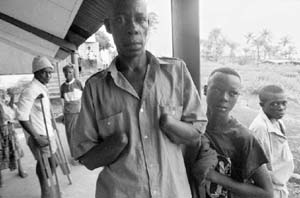


AMONGST THE WORST CRIMINALS OF THE TWENTIETH CENTURY
SIERRA LEONE : GRATUITOUS CRUELTY AGAINST CIVILIANS
ARREST SIERRA-LEONEAN CRIMINALS
IN 1998 AND 1999, THOUSANDS OF CIVILIANS HAVE BEEN MAIMED BY RUF REBELS
 |
 |
 |
Source and photos : Human Rights Watch
Edition française
The rebels repeatedly stated that they believed
civilians should be punished for what they perceived to be their support for the existing
government. Thus, the rebels waged war against the civilian population through
the perpetration of human rights abuses. While there was some targeting of particular
groups, such as Nigerians, police officers, journalists, and church workers, the vast
majority of atrocities were committed by rebels who chose their victims apparently at
random.
The arbitrary nature of these attacks served to create an atmosphere of complete
terror. Some victims were attacked for resisting rape or abduction, trying to
flee, trying to protect a friend or family member, or refusing to follow instructions to
dance or make music on the streets, but most described being chosen for execution
or mutilation at random, often without being asked a single question.
It is difficult to ascertain the level of seniority within the RUF at which the perpetration of human rights abuses was ordered, though the widespread participation in abuses suggests that they must have been authorized at a high level within the RUF's command structures. Victims and witnesses frequently overheard commanders on the ground give orders to perpetrate atrocities, and there are very few accounts of individual combatants or commanders trying to halt the abuses. When witnesses reported that individual combatants did object and try to halt the abuses, those objecting were often met with death threats from their fellow rebels.
The atrocities were often planned and premeditated. Victims and witnesses describe well-organized operations to round up civilians who were later executed, attacked with machetes, or raped. On several occasions rebels gave advance warning that atrocities were to be committed later.
Most victims and witnesses describe widespread usage by the rebels of drugs, marijuana, and alcohol and believe most of the atrocities were committed while under the influence of these substances. Witnesses describe rebels self-administering drugs by cutting small incisions around their temples, cheeks, and other places on their faces in which a brown or white powder was inserted and then covered with plasters or adhesive tape. The rebels spoke of this drug as being cocaine. Others observed rebels cutting the undersides of their arms with a razor blade and injecting themselves, and of taking small blue pills.One abductee asked a nine-year-old rebel about the drugs they were using and was told, it's a medicine they give us which makes us to have no respect for anybody; whatever we think to do, we just do it.
In his Second Progress Report on 16 October 1998, the Secretary-General stated that "the continuing conflict in Sierra Leone imposes immense suffering on the people of that country. I strongly condemn the summary executions, torture, mutilation, rapes, looting and other acts of barbarism carried out by former junta elements and call on them to lay down their arms and surrender. I am particularly outraged by the senseless acts of terror perpetrated against children, such as the amputation of limbs of boys and girls as young as six years of age, and I support the efforts to bring to justice the authors of these especially abhorrent crimes."
On June 14, 1999, Human Rights Watch spoke with Omraie Golley, official spokesperson and legal representative for the RUF. He denied that his troops had committed any atrocities against the civilian population during the January offensive He said that while they have received allegations, "I have yet to find firm evidence that points to individual soldiers or commanders responsible for committing any atrocities against the civilian population. We've heard a lot of stories, we've heard a lot of terrible things. These kinds of allegations are easy to make but difficult to prove. But, if any of our soldiers or commanders have been guilty of such atrocities they will be brought to book." Golley also stated that the RUF has not initiated any formal investigations or disciplinary proceedings against any individual soldier or commander.
The peace agreement signed on 7 July 1999 in Lomé, Togo, provided a general amnesty for all acts committed during the pursuit of the internal armed conflict since 1991. It therefore provides complete impunity to the perpetrators of the gross human rights abuses, including war crimes and crimes against humanity, which have characterized the conflict. Thousands of unarmed civilians - men, women and children - have been victims of the most grave violations of international humanitarian law, notably the Geneva Conventions.
The Special Representative of the UN Secretary-General, when signing the peace agreement on behalf of the UN, added a disclaimer that the UN does not recognize the amnesty as applying to international crimes of genocide, crimes against humanity, war crimes and other serious violations of international humanitarian law. It remains unclear, however, what status this disclaimer holds, both in principle and practice, and how it will be translated into a process whereby those alleged to have committed such crimes will be prosecuted.
There can be no amnesty for serious breaches of international humanitarian law and for human rights abuses which may amount to crimes against humanity. Each state which is party to the Geneva Conventions is under an obligation to bring those who have committed or ordered grave breaches of the Conventions to justice in its own courts, to extradite them to another country willing and able to do so or to transfer them to an international criminal court. (source : Amnesty International)
Contact : eur_alt@hotmail.com